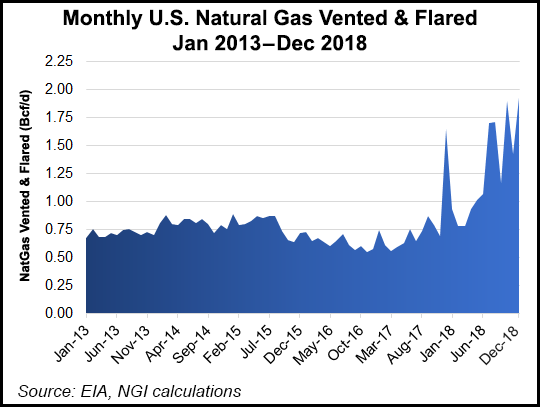NGI All News Access | Infrastructure
RNG’s Climate Benefits in Reducing GHG Questioned
A peer-reviewed study is questioning whether renewable natural gas (RNG) can help mitigate greenhouse gas (GHG) emissions.

The report by assistant professor Emily Grubert of the Georgia Institute of Technology (Georgia Tech) published by Environmental Research Letters concluded that RNG needs “to be carefully evaluated in the context of the long-run system conditions before it is adopted as a component of a zero greenhouse gas (GHG) energy system.”
The study focused on waste methane that otherwise would be emitted, waste methane that otherwise would be flared, and created methane that otherwise would not exist. Carbon for RNG is assumed to be climate neutral, Grubert said.
Use of the U.S. pipeline and processing network for carbon-neutral RNG would counteract the value of using the biogas substitute for traditional natural gas, Grubert said.
Methane leakage estimates are in the 2-4% range and can be up to as much as 15%, which means “policymakers should consider that under reasonable leakage and demand assumptions, RNG could be climate intensive,” according to the report.
While it is often assumed that RNG is produced from waste methane that would otherwise be emitted into the atmosphere, in reality most waste methane would be flared, Grubert said. In that regard, flared methane would be more climate beneficial than RNG with assumed production and processing leaks.
“The absolute GHG intensity of RNG is assumed to derive from methane leakage only,” Grubert said.
RNG advocates said the study miscalculated the role of system leakage and underscored the needs for more precise measurements.
“Our experience is that leakage from RNG upgrading is de minimis, and that makes sense given the financial incentives to capture and condition the waste methane for productive uses,” said RNG Coalition CFO David Cox.
NW Natural’s Anna Chittum, director of Renewable Resources, said the study was “well done, but misses some really key points…The study does not consider that flaring methane produces no ”work’,” as it produces carbon dioxide emissions “with no correlating economic activity.”
© 2024 Natural Gas Intelligence. All rights reserved.
ISSN © 1532-1231 | ISSN © 2577-9877 |
